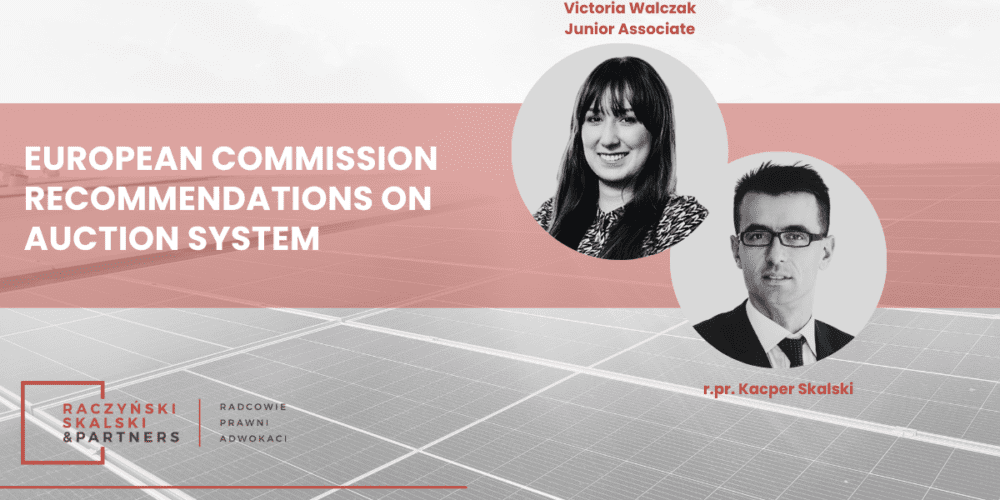On May 13, 2024, the European Commission published on its website recommendations and guidelines for the organization of auctions for renewable energy. Below is a summary of these recommendations, along with our opinion on their potential impact on your Generator business.
One of the main goals of the European Union is to achieve the desired results in the development of renewable energy sources and to double the existing installed capacity by 2030. To achieve this goal, the Union is planning to implement new rules for auctions for renewable energy sources, as properly conducted auctions can play a key role in achieving the desired results.
1. Contribute to the rapid, efficient and sustainable deployment of renewable energy sources and provide value to the sector.
European Union member states should actively promote the efficient and sustainable deployment of renewable energy, as only through concerted action can the set decarbonization goals of the entire Union be achieved. In order to enable generators to properly prepare for participation in auctions, the competent authorities should make a detailed auction schedule available in advance. Ideally, such a schedule covering the next five years should be published, along with precise expectations regarding investments, budget and other relevant information. This schedule should be binding, meaning that auction assumptions should not be modified at a later date.
In addition, the schedule should be available on an interactive EU platform created by the European Commission and made available by member states. In addition, the timing of renewable energy projects should take into account the risk of possible delays in the implementation of investments.
Comment:
In our opinion, such a schedule will undoubtedly make it easier for generators to prepare for the auction system. Knowing the detailed investment guidelines, generators will be able to plan in advance for the purchase of necessary RES infrastructure components. Taking into account the risk of investment delays will certainly reduce the burden and stress of having to meet short deadlines.
2. Ensure that the auction plan guarantees a competitive bidding process.
Auctions should be organized in a way that ensures a competitive bidding process. This means that auctions must be conducted in an open, non-discriminatory, cost-effective, transparent and understandable manner.
In the European Commission’s view, six weeks should be sufficient time to learn the auction criteria. However, for more complex investments, additional time should be provided to auction participants. In addition, the determination of the budget and volume of the auction should be carried out in such a way that the number of winning bids is large enough to guarantee effective competition.
Comment:
In our opinion, such recommendations will undoubtedly assist participants by providing them with clear auction terms and conditions. Generators will be able to easily familiarize themselves with the schedule and will have enough time to meet the requirements for their investments.
3. Providing legal certainty
Certainty of the auctions as to their legality is crucial to achieving the intended goals of the European Union. Lack of this certainty can lead to unnecessary delays in investment, which will consequently translate into delays in achieving the ambitious EU goals. In addition, a lack of legal certainty could undermine investor confidence in auctions, which in turn could negatively affect the pace of renewable energy deployment. Auction rules need to be unambiguous to ensure that generators can bid objectively, transparently and in a non-discriminatory manner.
If member states use non-price criteria, they must be well known to all participants before the auction begins. These criteria should also be verified for legality. The development and application of non-price criteria should also be done in a way that ensures their objectivity, transparency, non-discriminatory nature and full compliance with applicable laws.
Comment:
In our view, the above recommendations of the European Union will provide auction participants with a guarantee that bidding processes are in compliance with the law. This, in turn, will increase investors’ trust and confidence in the regularity of the auctions, which is crucial for the successful implementation of renewable energy sources.
4. Tailor the complexity of the auction design to the maturity of the market
The simplicity of the auctions plays a key role in the European Union’s decarbonization process. Simple rules will not only allow more experienced investors to participate in the auctions, but will also encourage new participants, which will increase the amount of renewable energy sources, in line with EU targets. The European Commission stresses that clear and simple rules also reduce the risk of illegality.
In addition, member states that do not yet have experience in the renewables sector will find it easier to introduce these technologies thanks to transparent and simple auction rules, increasing their chances of success. Overly stringent conditions can only lead to higher costs and burden technological investment, which can limit competition.
Comment:
In our view, such a recommendation will increase the number of participants, including those least experienced in auctions. Clear and legible rules will provide investors with confidence in the correctness of the auction, eliminating ambiguities and doubts about the regulations.
5. Involve market participants and experts at an early stage and during the auction design process
Adapting the auction to actual market conditions will ensure a successful auction. A key aspect is the involvement of market participants and experts in the process of developing auction specifications. The implementation of projects, non-price criteria or bids should lead to a competitive bidding process.
Implementation of the above can be achieved through stakeholder consultations, such as market dialogue or public consultations with industry representatives and investors.
Once the auction has begun, it is important for member states to proactively answer questions from potential bidders and make information available to all interested parties. Proper and, above all, timely communication with market participants significantly increases the chances of a successful auction outcome and builds confidence in the bidding process.
Comment:
In our opinion, such public consultations will assist and encourage investors to shape the auction system. Proper cooperation between, for example, the ERO and participants will help dispel doubts about auctions and, for example, the correct completion of documents. In view of this, it is undoubtedly a great convenience for participants.
6. Harmonization of the auction structure to reduce transaction costs
Due to the introduction of different auction system models in each Member State, additional unnecessary costs are generated when introducing RES. As a result, investments are more expensive causing restrictions on fair competition between investors. Differences in the design of RES investments also result in a diverse supply chain which, according to the EC, contributes badly to the establishment of non-price criteria such as quality.
Undoubtedly, each investor should be free to create RES and when choosing products. Nevertheless, it is important to adjust the needs of each country as to its development or capabilities.
Comment:
In our opinion, it is undoubtedly organic to introduce poor quality RES installations into the country, assuring participants that everyone is equal and should have the same conditions as to the choice of products.
7. Non-price criteria
The inclusion of non-price criteria, e.g. quality criterion, will allow to achieve low price and high quality. Cited, it is intended to encourage generators to achieve better results in establishing RES installations. It would be good to achieve low price vs. high quality. The inclusion of non-price criteria allows the realization of goals that cannot be achieved due to high prices. These criteria will also allow the realization of several goals like good quality environmentally friendly installations. One of the environmental goals includes avoiding collisions between wind farms and birds.
Non-price criteria listed by the EC:
– Sustainability and environmental protection
– Innovation
– Integration of energy systems
– Cyber security and international data transfer
– Contribution to resilience
– Endorsement of a code of responsible business conduct
– Benefits for local communities
The EC noted that Member States use non-price criteria only as pre-qualification criteria for auctions, and then only price plays a key role. According to the EC, sustainable development and environmental protection are among the equally important criteria and should be taken into account.
Comment:
In our opinion, the introduction of new non-price criteria could significantly affect the auction system by introducing additional rules that will have to be taken into account when selecting installations. Integration of these criteria requires auction participants not only to be competitive in terms of price, but also to meet high quality and environmental standards, which may consequently lead to greater investor involvement.
8. Measures to encourage full and timely completion of projects
Bidding rules should be prepared to promote high project completion. The European Commission plans to introduce additional measures that it believes will effectively encourage the completion of investments in renewable energy sources. One such measure is price indexation, which is designed to mitigate or cover the risk of an auction participant. This will reduce the risk of project failure or abandonment by the Generator.
Price indexation is a tool that allows prices to be adjusted in accordance with, for example: a certain inflation rate. This mechanism provides financial stability and confidence that the project can be implemented, despite changes in costs during implementation. Another important measure that the EC plans to introduce are penalties for failure to meet project implementation commitments.
Comment:
In our opinion, the introduction of price indexation will assure investors that they do not have to worry about the market and can confidently invest without worrying, about high prices. This will help increase the efficiency of RES project implementation. The system of penalties may not seem encouraging, while the above-mentioned recommendation to extend lead times may result in penalties not being awarded as often as participants fear.
9. Negative offer
A negative bid occurs when an investor undertakes to pay the state for the opportunity to develop a renewable energy project. The European Commission gives an example in which an investor, wishing to build an offshore wind farm, pays rent or leases the seabed from the state. The recommendation to introduce a negative bid is aimed at increasing the flexibility of the auction system and enabling a variety of energy projects.
Comment:
In our opinion, the introduction of negative bidding can significantly contribute to the development of the RES sector, as it allows more efficient use of natural and financial resources. Such a system encourages investors to optimize their projects and seek more innovative and cost-effective solutions.
10. Bidding ceilings
Member states should determine, the financial ceiling for the implementation of the auction, as well as what volume of electricity it intends to set. It is crucial that the specified amount of support in the auction system is sufficient for the member state.
According to the EC, a poor definition of financial support will result in participants not participating in the implementation of clean energy in the EU, thus slowing down the decarbonization process.
Comment:
From our point of view, this recommendation will not negatively affect auction participants. On the contrary, the appropriate setting of the financial ceiling and volume of electricity to be supported may increase investor confidence, encouraging active participation in auctions.
11. Leveling the playing field for renewable energy communities and SMEs (including citizens’ energy communities)
According to the EC, member states should provide more flexibility in pre-qualification requirements for SMEs or energy communities. The EC is also developing thoughts of introducing separate auction baskets where only community projects can compete.
Comment:
From our perspective, the above changes will reduce barriers to participation between “giants” and smaller entities or energy communities. This will allow for fair competition and increase the chances of inexperienced and smaller investors to win in the auction system.



